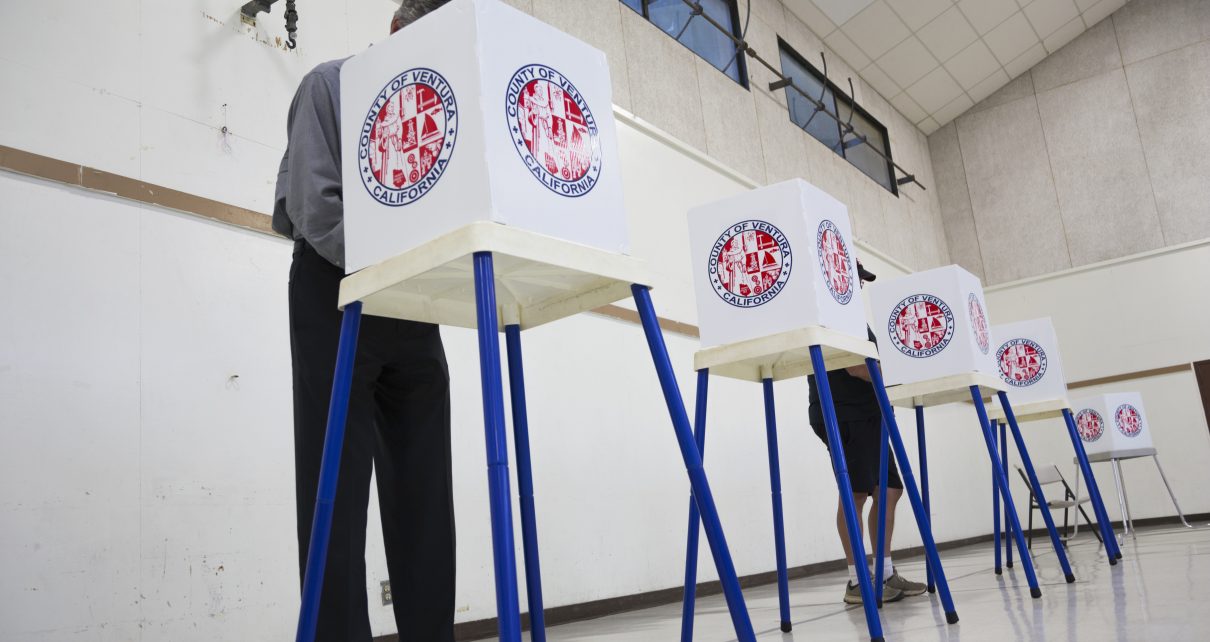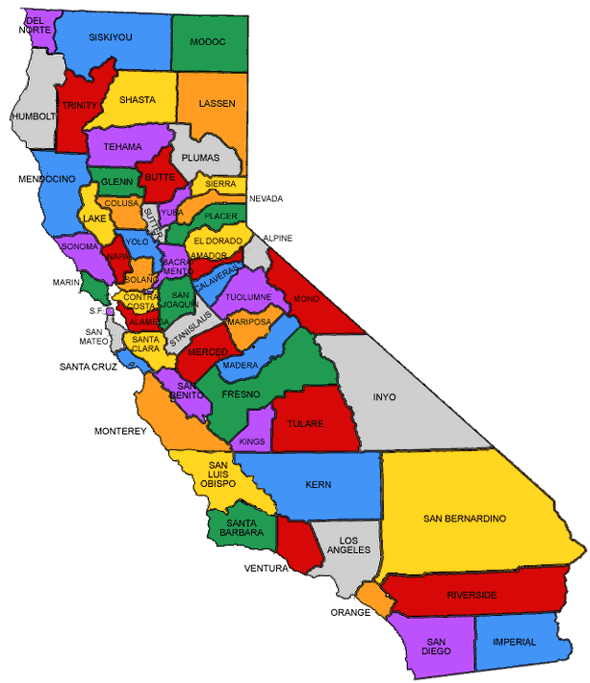
Citizen votes in election booth polling station in gymnasium, Oak View, CA Nov. 4, 2014. (Photo: Joseph Sohm/Shutterstock)
Legalized Sports Gambling in California? Bet on it!
Competing ballot propositions likely to be decided by voters
By Martin Marks, March 8, 2022 6:26 am
With 32 states now having legalized sports gambling in one form or another, California is a bit late to the table. But it’s game on in the Golden State as competing interests begin the battle that will likely lead to voters deciding what could be more than one sports wagering ballot proposals this November.
Following the U.S. Supreme Court’s 2018 decision brought by the state of New Jersey which overturned federal law prohibiting legalized sports wagering outside of Nevada, a flurry of activity ensued at the state level which has now led to more than 60% of states having some type of legal betting on sports activity.
California has long allowed for legalized gambling including lottery, parimutuel horse racing, card rooms, charitable raffles, and Native American-owned casinos. All but two states (Utah and Hawaii) permit state sanctioned gambling in some form.The tax revenue raised by state and local governments across the land from these activities exceeds $30 Billion annually with sports wagering contributing more than $1B. Potential revenue realized from legalized sports gambling makes its prospect for California all the more attractive for state officials.
Sports gambling can take many forms. Most notably, illegal sports gambling, the long-held domain of organized crime, is estimated to produce $50-$200 Billion in aggregate bets annually. This still dwarfs what is happening in the legal betting market. Illegal gambling is likely to persist as it has the advantage of offering better odds to its customers as the legal market must necessarily factor in licensing fees and tax revenue to be sent along to various government treasuries. Illegal sports gambling also has the at times treacherous advantage of accepting wagers “on credit” without first having to submit money up front as the legal sports wagering requires.
Legal sports wagering can take several forms, and this is the crux of the likelihood of multiple proposals appearing on the California ballot this November. As with most of these issues, follow the money.
The first type of legal sports gambling would require in person wagering at any of California’s Tribal Casinos and at its four racetracks. This is the premise of the proposed California Sports Wagering Regulation and Unlawful Gambling Enforcement Act which of course has the backing of Tribal Casino owners and claims to reduce fraud and the prospect of underage gambling.
The second type of legal sports wagering is done remotely online and this is the goal of the California Solutions to Homeless and Mental Health Support Act. The act’s title perhaps deceptively makes no mention of gambling, but altruistically has revenue set aside to combat the homeless crisis in California. This proposal has the support of online gambling behemoths such as Draft Kings and Fan Duel. Its opponents of course are the aforementioned Tribal-owned casinos.
A third competing proposal for the ballot is known as the Age-Verified Tribal Online and In-Person Sports Wagering Act which goes for the whole ball of wax and allows for both in person and online sports wagering in a hybrid version of the first two proposals.
The California Legislative Analyst’s Office projects state tax revenue measured in the tens of millions of dollars for in-person sports wagering to hundreds of millions of dollars for online or an in-person/online hybrid. With the stakes so high for not only casinos and online gaming companies, but also for state treasury coffers, it is possible that the advocacy for legalized sports gambling in California and its lead-up to November could be the costliest ballot proposition battle in California history.
The pros and cons to legalized sports gambling for California are fairly obvious. With illegal gambling firmly embedded as one of society’s favorite vices and not going anywhere anytime soon, why shouldn’t the taxpayers get a cut of the action from its proceeds? With legalized sports wagering already available in more than 30 states, California is already losing out as those Californians wanting to place a legal wager are crossing state lines to do so. Why not keep that action within our borders? After all, California has more professional sports teams than any other state. A second Gold Rush potentially awaits. Additionally, if lawmakers can actually keep to the promise of earmarking funds to the cause of our homeless and mental health crises, is that such a bad thing? Depending on the ultimate form of legalized sports gambling, there is also the prospect of creating countless jobs associated with the sports gaming industry.
The downside of bringing legal sports betting to California? Certainly, the online variety of gambling including sports wagering could be viewed as more problematic than in person wagering. Placing a bet is just a click away on your smart phone. With the rise of online gambling and sports wagering in particular, there has been a predictable spike in gambling addiction with younger people more likely to be affected. Unlike drug and alcohol addiction there are no overt physical signs of a problem. In essence, it is an invisible addiction. Calls to and participation with gambling disorder help providers have increased since that 2018 Supreme Court ruling which increased the availability of sports gambling.
Not to be lost sight of, money laundering of ill-gotten gains is one of the hazards associated with legal gambling. The gaming industry and law enforcement have legitimate concerns that any expansion of online gambling presents greater opportunities for the washing of dirty money.
Sports organizations such as MLB, NFL, NBA, NHL, NCAA, et. al. have historically been opposed to an expansion of legalized sports gambling fearing it could jeopardize the integrity of the game through cheating scandals. Yet, gambling on sports yields more interest in the game and more viewership. More viewership yields revenue measured in the millions if not billions of dollars.
Now it is not unusual to have sports broadcasts dedicate segments sponsored by online gambling sites with in-depth looks at the gambling odds for the various teams and players participating in that day’s events. It appears that many of these sports organizations have accepted that legal sports gambling is here to stay and have chosen to cash in themselves.
So, what are the prospects of some type of sports gambling being approved by California voters this November? A recently released Cal Berkeley poll provides some preliminary insight. 45% of registered voters favor legalized sports betting with 33% being opposed. The poll showed 22% at this point still undecided, but with millions of advocacy dollars likely to be spent in the coming months, it is logical to surmise that a majority of those undecided will be swayed to the favoring legalized sports wagering side. And if I was a betting man (and I am), I’d lay 3 to 5 that Californians will be able to legally wager on Super Bowl LVII to be held in February 2023.
- Time to Take The Human Touch Out Of Redistricting - January 20, 2026
- Vice President Vance Visits The Golden State - February 22, 2025
- Is DEI Ready To DIE? - January 4, 2025





One thought on “Legalized Sports Gambling in California? Bet on it!”